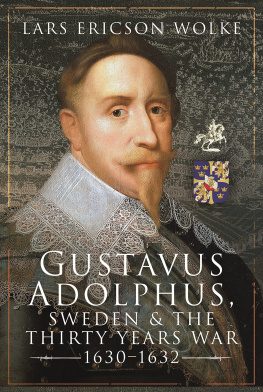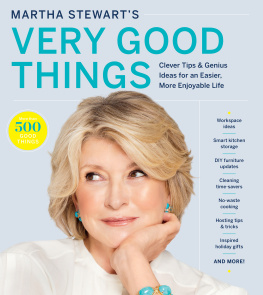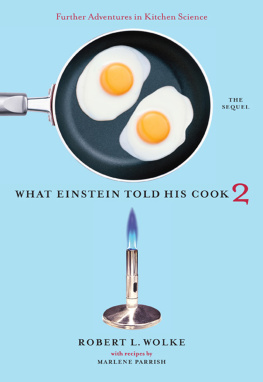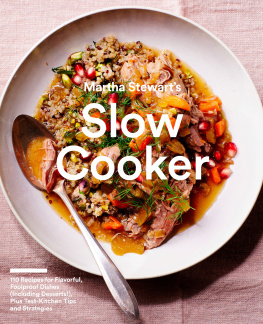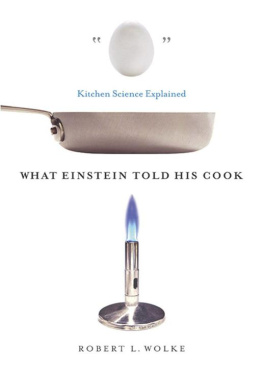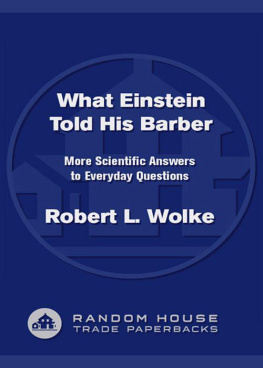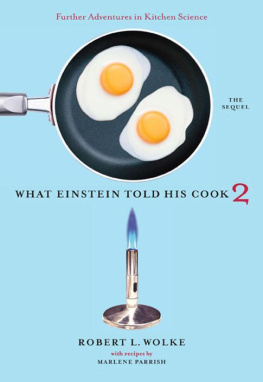Wolke - What Einstein Told His Cook: Kitchen Science Explained
Here you can read online Wolke - What Einstein Told His Cook: Kitchen Science Explained full text of the book (entire story) in english for free. Download pdf and epub, get meaning, cover and reviews about this ebook. year: 2010;2002, publisher: W. W. Norton & Company, genre: Home and family. Description of the work, (preface) as well as reviews are available. Best literature library LitArk.com created for fans of good reading and offers a wide selection of genres:
Romance novel
Science fiction
Adventure
Detective
Science
History
Home and family
Prose
Art
Politics
Computer
Non-fiction
Religion
Business
Children
Humor
Choose a favorite category and find really read worthwhile books. Enjoy immersion in the world of imagination, feel the emotions of the characters or learn something new for yourself, make an fascinating discovery.
- Book:What Einstein Told His Cook: Kitchen Science Explained
- Author:
- Publisher:W. W. Norton & Company
- Genre:
- Year:2010;2002
- Rating:4 / 5
- Favourites:Add to favourites
- Your mark:
- 80
- 1
- 2
- 3
- 4
- 5
What Einstein Told His Cook: Kitchen Science Explained: summary, description and annotation
We offer to read an annotation, description, summary or preface (depends on what the author of the book "What Einstein Told His Cook: Kitchen Science Explained" wrote himself). If you haven't found the necessary information about the book — write in the comments, we will try to find it.
Wolke: author's other books
Who wrote What Einstein Told His Cook: Kitchen Science Explained? Find out the surname, the name of the author of the book and a list of all author's works by series.
What Einstein Told His Cook: Kitchen Science Explained — read online for free the complete book (whole text) full work
Below is the text of the book, divided by pages. System saving the place of the last page read, allows you to conveniently read the book "What Einstein Told His Cook: Kitchen Science Explained" online for free, without having to search again every time where you left off. Put a bookmark, and you can go to the page where you finished reading at any time.
Font size:
Interval:
Bookmark:
What Einstein Told His Cook
I have enjoyed Bob Wolkes column in the Post for years, and his book is as good a read on the science of cooking as there is. Bob is not only well educated, he is a wit and a wonderful, gifted writer who can make anyone understand whats behind the magic that happens in the kitchen. His sound, clever recipes are a welcome bonus.
Mark Bittman, author of How to Cook Everything
The best book on food (not a cookbook) of 2002. Robert Wolkes book is so full of useful information that youll find yourself referring to it again and again. Not only does he have the penetrating mind of a chemistry professor, but Robert Wolke also has a tremendous sense of humor. Besides being packed with all kinds of interesting food science tidbits, this book is just plain funny.
SauteWednesday.com
Robert Wolkes terrific book will be invaluable and accessible to every cook. The style is clear, the text is honest, and perhaps best of all the book is fun to read, filled with the whys and hows of the kitchen.
Paula Wolfert, author of Mediterranean Cooking and Mediterranean Grains and Greens
The occasional recipe adds diversity but facts are the books strong point. What Einstein Told His Cook is a scientifically accurate but witty and entertaining study of the chemistry of food and cooking.
Elliot Ketley, Restaurant (UK)
This book should be on the shelf of any serious cooks library. By demystifying the fundamentals of the kitchen, it empowers the cook to navigate recipes with confidence and control.
Lidia Matticchio Bastianich, author of Lidias Italian-American Kitchen and Lidias Italian Table
Wolke [is] a chemist with a preternatural ability to explain complex chemical reactions in simple terms. Whatever the magnitude of the topic, Wolke addresses it with the same understated intelligence and paternal humor.
Tim Carman, Washington City Paper
If you read Bob Wolkes What Einstein Told His Cook , you may have to kick some old wives tales right out of the kitchen. One of the books joys is that some quirks of the kitchen may never have occurred to us. Thats what makes Bob Wolke the science teacher we wished we had when we were stuck with Big Bad Science Snob. Hes not afraid to lunge at a joke to explain a concept when Big Bad would have bored us silly with irrelevant detail.
Suzanne Martinson, Pittsburgh Post-Gazette
Robert L. Wolkes recipes are lab experiments you can eat. Thats what makes reading What Einstein Told His Cook so much fun for the avid home chef who derives as much pleasure from understanding food as eating it.
New York City Record
For the kitchen nerd with a sense of humor. An absorbing read.
Food & Wine (Ireland)
Good science only adds to the enjoyment of the culinary arts. With a sauce of wit and panache, Wolke serves up commonsense answers to every question that a curious cook could ask.
Roald Hoffman, 1981 Nobel Laureate in Chemistry
TEXTBOOKS
Impact: Science on Society
Chemistry Explained
TRADE BOOKS
What Einstein Didnt Know:
Scientific Answers to Everyday Questions
What Einstein Told His Barber:
More Scientific Answers to Everyday Questions
What Einstein Told His Cook 2:
The Sequel; Further Adventures in Kitchen Science
Kitchen Science Explained
with recipes by Marlene Parrish
W. W. NORTON & COMPANY
New York London
Copyright 2002 by Robert L. Wolke
Copyright 2002 by Marlene Parrish
All rights reserved
First published as a Norton 2008
Recipe for Chocolate Velvet Mousse adapted from Chocolate Mousse with Olive Oil, published in The Best American Recipes 2000 , Houghton Mifflin, 2000. Adaptation printed by permission of Teresa Barrenechea. Recipe for Champagne Jelly in The Best American Recipes 1999 , Houghton Mifflin, 1999. Recipe copyright 1998 by Lindsey Shere. Reprinted by permission of Lindsey Shere.
For information about permission to reproduce selections from this book, write to Permissions, W. W. Norton & Company, Inc., 500 Fifth Avenue, New York, NY 10110
Illustrations by Alan Witschonke
Library of Congress Cataloging-in-Publication Data
Wolke, Robert L.
What Einstein told his cook: kitchen science explained / Robert L. Wolke; with recipes by Marlene Parrish.1st ed.
p. cm.
Includes bibliographical references.
ISBN: 978-0-393-33987-1
1. Cookery. 2. ScienceMiscellanea. I. Parrish, Marlene. II. Title.
TX652.W643 2002
641.5dc21 2002001708
W. W. Norton & Company, Inc., 500 Fifth Avenue, New York, N.Y. 10110
www.wwnorton.com
W. W. Norton & Company Ltd., Castle House, 75/76 Wells Street, London W1T 3QT
This book is dedicated to my wife, partner,
colleague, and motivator, Marlene Parrish.
A long with the recent explosion of interest in food and cooking has come a growing desire to understand the chemical and physical principles that determine the properties and behavior of our foods.
This book explains the science behind both the foods themselves and the tools we use to prepare them. Its organization and index have been devised to make it easy to find a particular fact or explanation.
Home cooks and professional chefs not only cook but they must first buy ingredients. Todays technology produces such a baffling variety of food products that many cooking problems begin in the market. I have therefore included discussions of both natural and prepared foods, where they come from, what they are made of, and what the practical consequences may be for the cook and consumer.
Having taught at universities for more years than I care to count, and having spent ten of those years as the founding director of a Faculty Development Office helping faculty members to improve their teaching, I recognize two possible approaches to explaining kitchen science. Ill call them the college method and the experience method.
In the college method, I would write what amounts to a textbook on kitchen science and then bid my students to go out into the world and apply their acquired knowledge to solve practical problems that arise in the future. That approach presumes that all the course content will have been mastered and recalled whenever needed. But both my experience as a teacher and undoubtedly yours as a former student testify to the futility of that approach. (Quick: Who fought in the Battle of Hastings?)
In short, the college method attempts to supply answers before the questions arise, whereas in real life, questions crop up without warning and must be dealt with on the spot.
But what if you didnt have to plow through a lot of science, yet every time you were mystified by something you could ask a scientist to explain that specific problem, no more and no less? While you cant have a scientist (much less an Einstein) always at your elbow, the next best thing might be to have at your disposal a compilation of answers to questions that you yourself might be likely to come up with, along with plain, no-nonsense explanations of whats happening. Thats the experience method. In this book, I have selected well over a hundred questions that have been asked of me by real-life cooks, readers of my Food 101 column in The Washington Post and other newspapers.
In addition to explanations of the underlying science, you will find a number of unusual and imaginative recipes developed by my wife, Marlene Parrish, a food professional. The recipes were specifically designed to illustrate the principles being explained. They may be thought of as a lab course that you can eat.
Each question-and-answer unit is designed to stand by itself. Whether prompted by the table of contents, the index, or a question that pops into your head, you can open the book and read the relevant unit without having had to master a series of earlier concepts.
Font size:
Interval:
Bookmark:
Similar books «What Einstein Told His Cook: Kitchen Science Explained»
Look at similar books to What Einstein Told His Cook: Kitchen Science Explained. We have selected literature similar in name and meaning in the hope of providing readers with more options to find new, interesting, not yet read works.
Discussion, reviews of the book What Einstein Told His Cook: Kitchen Science Explained and just readers' own opinions. Leave your comments, write what you think about the work, its meaning or the main characters. Specify what exactly you liked and what you didn't like, and why you think so.



